Introduction
As a macaw owner or enthusiast, one of the most fundamental questions you might have is: how often do macaws eat? Understanding the proper feeding schedule and nutritional requirements of these magnificent birds is crucial for their health and longevity. Macaws in the wild have evolved specific feeding patterns that we need to replicate in captivity to ensure they thrive. In this comprehensive guide, we’ll explore everything you need to know about macaw feeding habits, schedules, and nutritional needs.
Macaws are among the largest and most colorful members of the parrot family, with species like the Blue and Gold, Scarlet, and Hyacinth macaws being popular pets. These intelligent birds require proper nutrition to maintain their vibrant plumage, energy levels, and overall well-being. Knowing how often do macaws eat and what to feed them is essential for preventing nutritional deficiencies and related health problems.
In their natural habitat, macaws spend a significant portion of their day foraging for food. Their diet consists of a variety of fruits, nuts, seeds, and vegetables that provide them with essential nutrients. As responsible pet owners, we must understand and replicate these feeding habits as closely as possible to ensure our feathered friends lead healthy, happy lives.
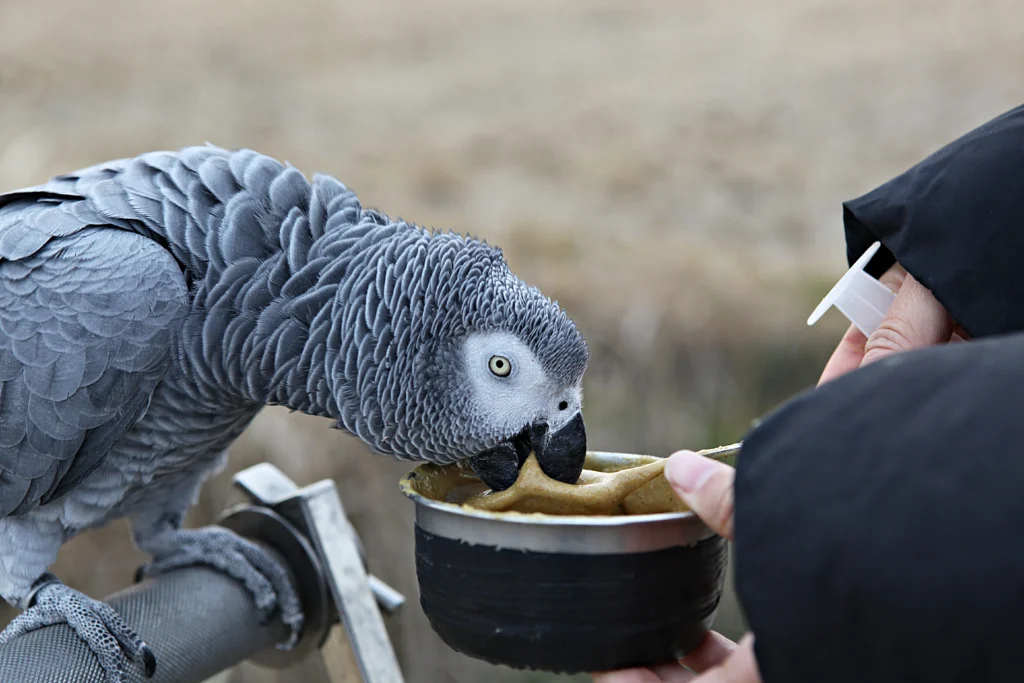
How Often Do Macaws Eat in the Wild?
Before we delve into captive macaw feeding schedules, it’s helpful to understand their natural eating patterns. In the wild, how often do macaws eat? These magnificent birds typically feed 2-3 times per day, with most of their feeding activity occurring in the early morning and late afternoon. This pattern is influenced by several factors:
- Food availability: Wild macaws must search for seasonal fruits, nuts, and seeds, which affects their feeding frequency.
- Temperature: Macaws tend to be more active during cooler parts of the day, making these prime feeding times.
- Predator avoidance: Feeding during specific times helps macaws minimize exposure to predators.
- Social behavior: Wild macaws often feed in flocks, creating a community dynamic around meal times.
Wild macaws spend several hours daily foraging, which not only provides nutrition but also mental stimulation. This natural behavior is important to consider when establishing how often do macaws eat in captivity and designing an appropriate macaw diet plan.
According to a study published in the Journal of Exotic Pet Medicine, wild macaws spend approximately 4-6 hours daily engaged in foraging activities. This extensive time commitment highlights the importance of food in their daily routine and suggests that captive feeding practices should incorporate elements of mental enrichment alongside nutritional considerations.
Recommended Macaw Feeding Schedule for Pet Birds
For pet macaws, establishing a consistent macaw feeding schedule is essential for their physical and psychological well-being. But how often do macaws eat when kept as pets? Here’s a recommended feeding regimen based on expert advice and scientific research:
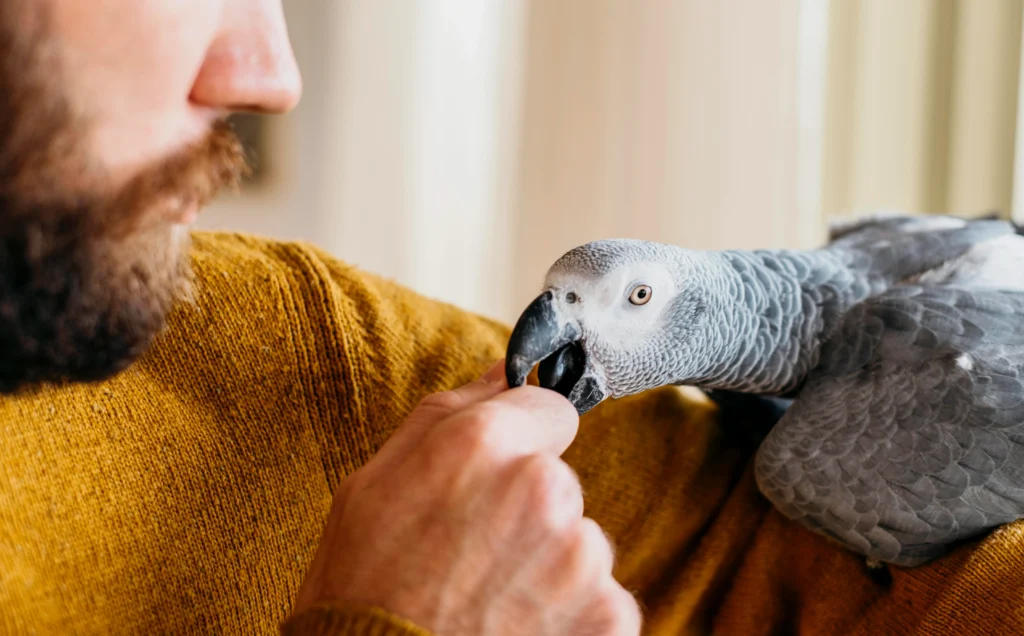
Morning Feeding (7-9 AM)
The first meal of the day should be the largest, consisting of:
- Fresh pellets (70% of the morning portion)
- Chopped vegetables and leafy greens (20%)
- Fresh fruits (10%)
This morning meal is crucial because it aligns with when macaws eat most actively in the wild. Your macaw will typically be hungry after the night and ready for substantial nutrition.
Afternoon Feeding (1-3 PM)
A smaller meal that includes:
- Additional pellets
- A small portion of vegetables
- Occasional healthy treats
Evening Feeding (5-7 PM)
The final meal before bedtime should include:
- Pellets
- Seeds and nuts (in moderation)
- Small amount of fruit
This macaw feeding schedule mimics their natural eating patterns and ensures they receive proper nutrition throughout the day. Consistency in timing is important, as macaws thrive on routine.
Dr. Susan Orosz, a renowned avian veterinarian, emphasizes that “regular feeding times help establish healthy eating habits and can prevent behavioral issues related to food insecurity.” Maintaining a consistent schedule answers the question of how often do macaws eat and also supports their psychological well-being.
How Much Should a Macaw Eat Daily?
Understanding how much should a macaw eat daily is just as important as knowing how often do macaws eat. The appropriate food quantity depends on several factors:
- Species size: Larger species like Hyacinth macaws require more food than smaller species like Severe macaws.
- Age: Young, growing macaws need more food relative to their body size compared to adults.
- Activity level: More active birds require additional calories.
- Health status: Birds recovering from illness or with certain medical conditions may have special dietary needs.
As a general guideline, most adult macaws consume approximately 10-15% of their body weight in food daily. For an average Blue and Gold macaw weighing about 900-1100 grams, this translates to roughly 90-165 grams of food per day, distributed across their feeding times.
When determining how often do macaws eat and in what quantities, it’s essential to monitor your bird’s weight and condition. A healthy macaw should maintain a stable weight with a well-defined keel (breastbone) that’s neither too prominent nor completely covered by muscle and fat.
The Association of Avian Veterinarians recommends weighing your macaw weekly using a digital scale to track any significant weight changes that might indicate problems with your macaw feeding schedule or overall health.
Creating an Optimal Macaw Diet Plan
A balanced macaw diet plan is crucial for answering not just how often do macaws eat but also what they should consume. Here’s a comprehensive breakdown of an ideal diet:
1. High-Quality Pellets (60-70% of Diet)
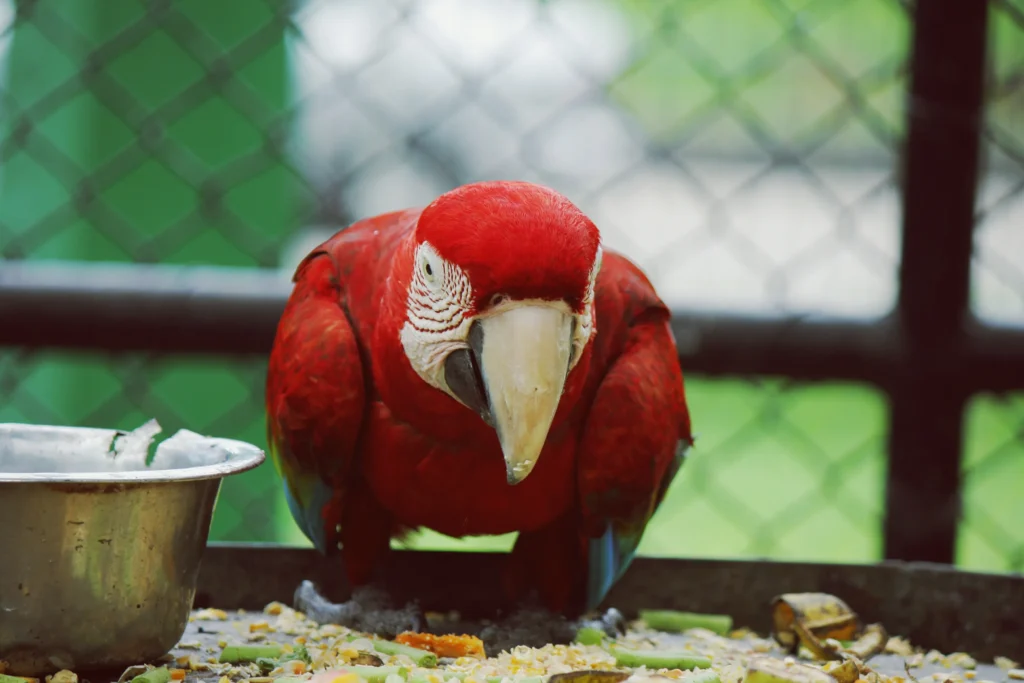
Formulated pellets provide a balanced base of nutrition and should constitute the majority of your macaw’s diet. Choose brands specifically formulated for large parrots without artificial colors or preservatives. Pellets address the fundamental question of what do macaws eat by providing essential vitamins and minerals in appropriate ratios.
2. Fresh Vegetables and Leafy Greens (20-25%)
These provide essential vitamins, minerals, and antioxidants. Excellent choices include:
- Dark leafy greens (kale, spinach, collard greens)
- Bell peppers
- Carrots
- Broccoli
- Sweet potatoes
- Squash
When considering how often do macaws eat vegetables, aim to provide fresh options daily as part of their regular meals.
3. Fruits (10-15%)
Fruits provide natural sugars, vitamins, and hydration. Good options include:
- Apples (without seeds)
- Berries
- Mangoes
- Papayas
- Bananas
- Melons
While fruits are nutritious, they should be limited due to their sugar content. Understanding what do macaws eat in appropriate proportions helps prevent obesity and related health issues.
4. Nuts and Seeds (5-10%)
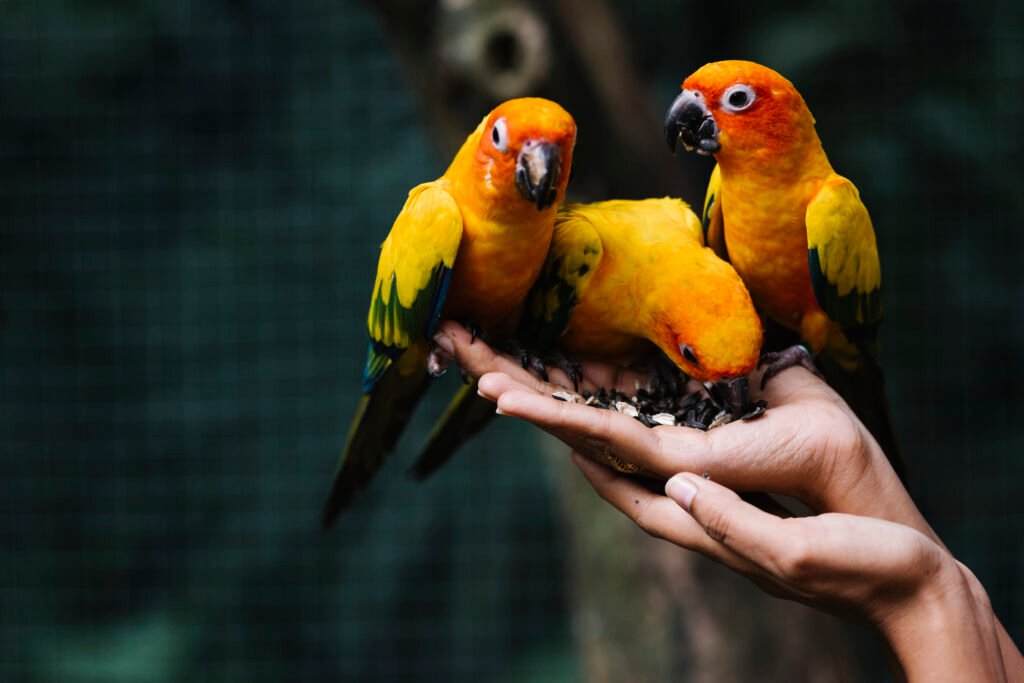
These should be given sparingly as they’re high in fat:
- Almonds
- Walnuts
- Brazil nuts
- Macadamia nuts
- Sunflower seeds
- Pumpkin seeds
Nuts and seeds are natural components of what do macaws eat in the wild, but captive birds don’t expend as much energy, making portion control essential.
5. Occasional Protein Sources
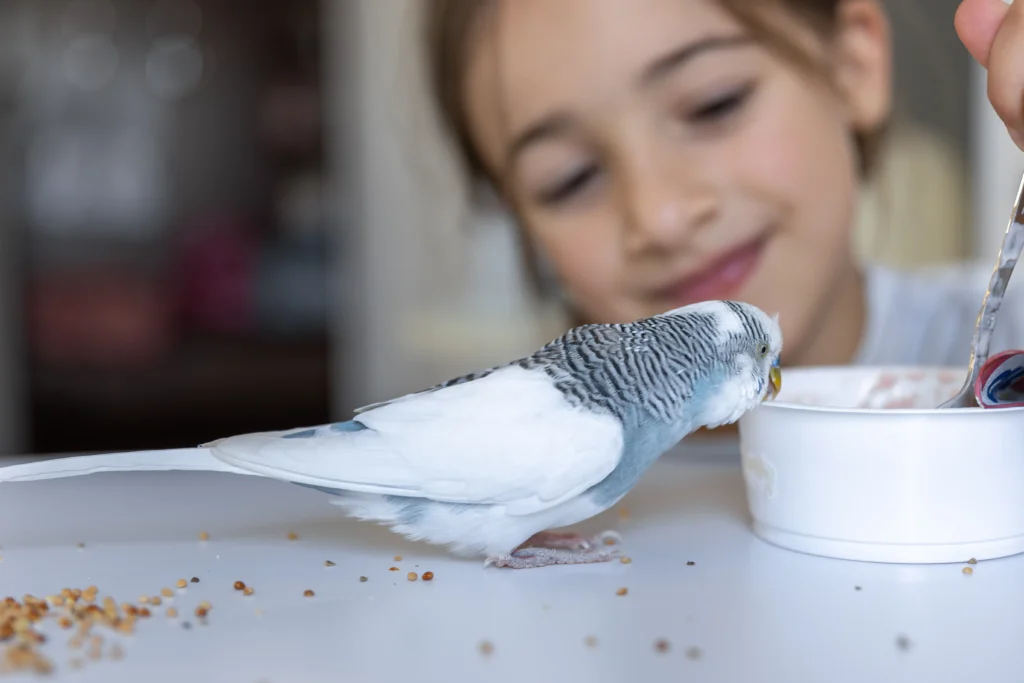
Small amounts of cooked egg, chicken, or legumes can provide additional protein. These shouldn’t make up more than 5% of the overall diet but can be important supplements when considering how often do macaws eat protein-rich foods.
According to research published in the Journal of Avian Medicine and Surgery, a diverse diet that mimics natural feeding patterns is associated with better health outcomes and longevity in captive macaws. This diversity not only addresses how often do macaws eat but also ensures nutritional completeness.
Special Considerations for How Often to Feed a Blue and Gold Macaw
Blue and Gold macaws (Ara ararauna) are one of the most popular macaw species kept as pets. When considering how often to feed a Blue and Gold macaw specifically, there are some unique considerations:
- Metabolic rate: Blue and Gold macaws have a relatively efficient metabolism, meaning they might need slightly less food than larger species like Hyacinth macaws.
- Food preferences: Many Blue and Gold macaws show strong preferences for certain foods, which can affect their willingness to eat at scheduled times.
- Social eating: These highly social birds often prefer to eat when their human companions are eating, which may influence optimal feeding times.
A typical adult Blue and Gold macaw weighing around 1kg should consume approximately 100-150g of food daily, divided across 2-3 meals. This addresses both how often do macaws eat and how much is appropriate for this specific species.
Dr. Brian Speer, a respected avian veterinarian, notes that “Blue and Gold macaws thrive on routine and consistency in their feeding schedule. Once established, try to maintain regular feeding times to promote healthy eating habits.”
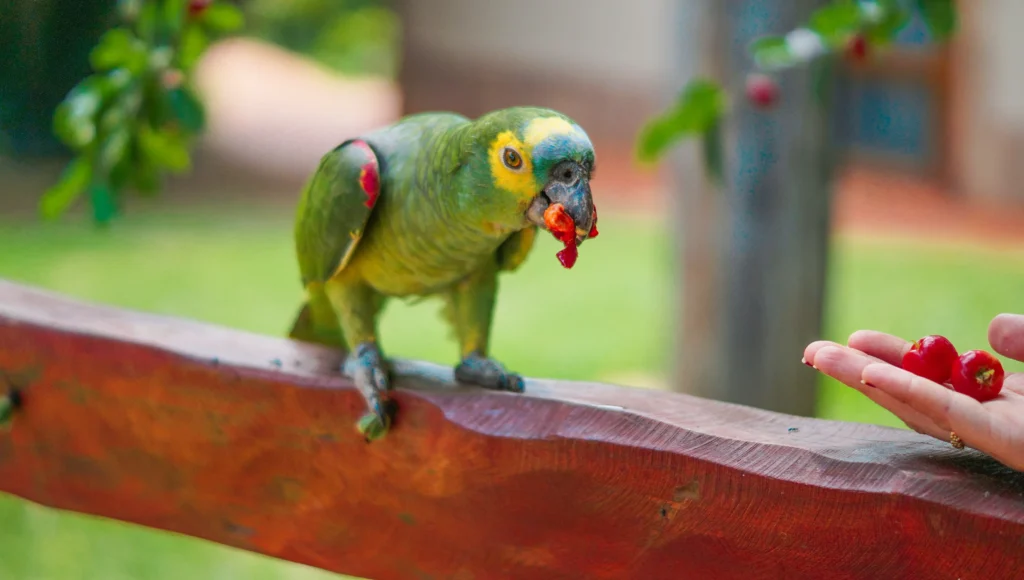
How Often Do Baby Macaws Eat?
The feeding requirements of baby macaws differ significantly from adults. If you’re raising a young macaw, you might wonder: how often do baby macaws eat? Here’s what you need to know:
Hatchlings to 2 Weeks
- Feed every 2-3 hours, including overnight feedings
- Hand-feeding formula specifically designed for parrots
- 6-8 feedings daily
2-4 Weeks
- Feed every 3-4 hours
- Can skip overnight feeding as they begin sleeping through the night
- 5-6 feedings daily
4-8 Weeks
- Feed every 4 hours
- 4-5 feedings daily
8-12 Weeks
- Feed every 5-6 hours
- 3-4 feedings daily
- Begin introducing soft foods alongside formula
12+ Weeks
- Gradually transition to adult feeding schedule
- Begin introducing pellets and soft foods
- 3 meals daily
Understanding how often do baby macaws eat is crucial for their development. Baby macaws require more frequent feeding because they have higher metabolic rates and are rapidly growing. As they mature, you’ll gradually transition them to the adult macaw feeding schedule discussed earlier.
The Association of Avian Veterinarians recommends monitoring a baby macaw’s crop (the expandable pouch in their throat where food is stored initially) to ensure they’re getting enough nutrition. A properly filled crop should feel like a soft, partially filled water balloon after feeding.
What Not to Feed a Macaw
While understanding how often do macaws eat is important, knowing what foods to avoid is equally critical for their health. The following items should never be part of a macaw diet plan:
- Avocado: Contains persin, which is toxic to birds and can be fatal.
- Chocolate: Contains theobromine, which birds cannot metabolize.
- Caffeine: Causes cardiac distress, hyperactivity, and potential heart problems.
- Alcohol: Even small amounts can be toxic to a macaw’s system.
- Salty foods: Macaws cannot process large amounts of salt.
- Onions and garlic: Contain compounds that can damage red blood cells.
- Fruit seeds and pits: Many contain cyanide compounds (especially apple, cherry, peach, and plum pits).
- Rhubarb: Contains oxalic acid, which is toxic to birds.
- Sugary or fatty human foods: Can lead to obesity and fatty liver disease.
- Dairy products: Birds lack the enzymes to properly digest lactose.
Dr. Laurie Hess, a board-certified avian veterinarian, warns that “a significant number of emergency cases we see in macaws are due to ingestion of toxic foods that could have been easily avoided with proper education about appropriate bird diets.” This underscores the importance of knowing not just how often do macaws eat but also what they should never consume.
How Long Can a Macaw Go Without Food?
While it’s important to maintain a regular macaw feeding schedule, you might wonder: how long can a macaw go without food in case of emergencies or travel? Generally, healthy adult macaws should never go more than 24 hours without food. Beyond this timeframe, they risk developing serious health complications, including:
- Hypoglycemia: Low blood sugar can lead to weakness, seizures, and loss of consciousness.
- Hepatic lipidosis: This dangerous condition occurs when the body begins metabolizing fat stores, potentially causing liver damage.
- Muscle wasting: Prolonged food deprivation leads to the breakdown of muscle tissue.
- Immune suppression: Nutritional deficiencies quickly impact immune function.
For baby macaws, the timeframe is much shorter. Young birds can experience health problems after just 4-6 hours without food, which is why understanding how often do baby macaws eat is so critical.
If you must travel with your macaw, always bring an adequate supply of their regular food, and never rely on being able to find appropriate substitutes during your journey. Remember that the question of how often do macaws eat should always be answered with consistency and reliability.
5 Critical Feeding Rules to Avoid Illness
To ensure your macaw remains healthy, follow these essential rules regarding how often do macaws eat and what they consume:
Rule 1: Maintain Consistent Feeding Times
Macaws thrive on routine. Erratic feeding schedules can cause stress and digestive issues. Stick to a regular macaw feeding schedule with meals at approximately the same times each day. This consistency helps your bird’s digestive system function optimally and prevents anxiety-related behaviors.
Rule 2: Provide Fresh Food Daily
Uneaten fresh foods should be removed after 2-4 hours to prevent bacterial growth. Pellets can typically remain in the cage longer but should be replaced daily. Fresh, clean water should always be available and changed at least twice daily. This practice ensures that when considering how often do macaws eat, they’re consuming fresh, safe food.
Rule 3: Balance Nutrition Over Days, Not Single Meals
Don’t panic if your macaw doesn’t eat every offered food at each meal. Instead, focus on nutritional balance over several days. This approach aligns with how macaws naturally eat in the wild, where their diet varies based on food availability. The key is ensuring that over time, they receive all necessary nutrients regardless of how often do macaws eat each specific food type.
Rule 4: Transition Diet Changes Gradually
Abrupt changes to what or how often do macaws eat can cause digestive upset or food rejection. When introducing new foods or adjusting feeding schedules:
- Mix new foods with familiar ones, gradually increasing the proportion of new items
- Allow 2-3 weeks for complete dietary transitions
- Monitor droppings for changes that might indicate digestive issues
Rule 5: Monitor Weight and Adjust Portions Accordingly
Regular weighing (weekly) helps ensure your macaw diet plan is providing appropriate nutrition. Weight changes can indicate whether adjustments are needed to how much or how often do macaws eat. An accurate digital scale is an essential tool for responsible macaw owners.
Dr. Scott Echols, an avian nutrition specialist, emphasizes that “preventative nutrition is far more effective than treating diet-related diseases after they develop.” Following these five rules helps prevent many common health issues in captive macaws.
Signs Your Macaw’s Feeding Schedule Needs Adjustment
Even with careful planning of how often do macaws eat, you may need to adjust your approach based on your bird’s individual needs. Watch for these signs that your macaw feeding schedule requires modification:
- Weight changes: Gaining or losing more than 10% of body weight.
- Lethargy: Unusual tiredness or decreased activity could indicate nutritional deficiencies.
- Feather condition: Poor feather quality or feather plucking may indicate nutritional problems.
- Droppings changes: Alterations in consistency, color, or frequency of droppings.
- Food wastage: Consistently throwing or ignoring certain foods.
- Increased begging: Constant food solicitation between meals may indicate insufficient portions.
- Aggression around feeding times: Could indicate food insecurity or improper timing.
If you notice any of these signs, consult with an avian veterinarian to reassess how often do macaws eat and what comprises their diet. Individual needs can vary, and your specific bird may require customization of general feeding guidelines.
Enrichment and Natural Feeding Behaviors
Understanding how often do macaws eat is just one aspect of their nutritional needs. Equally important is how they eat. In the wild, macaws spend hours foraging, manipulating food items, and working for their meals. This natural behavior provides essential mental stimulation and exercise.
To incorporate this aspect into your pet’s routine:
- Food puzzles: Use commercially available or homemade puzzle feeders that require problem-solving to access food.
- Foraging toys: Hide small food items in specialized toys or natural materials like clean pine cones.
- Scatter feeding: Distribute small food items throughout the cage for your macaw to find.
- Food skewers: Place fruits and vegetables on skewers so your bird must work to remove them.
- Natural branches: Certain safe, non-toxic branches can be provided with bark intact, allowing your macaw to forage for insects and consume beneficial bark.
These enrichment techniques complement your understanding of how often do macaws eat by addressing the psychological aspects of feeding. According to behavioral research, macaws that engage in natural foraging behaviors show fewer stress-related behaviors like feather plucking and screaming.
The World Parrot Trust recommends that “captive macaws should spend at least 40% of their waking hours engaged in foraging and feeding activities,” which closely mirrors their behavior in the wild.
Seasonal Variations in Macaw Diets
In their natural habitat, what do macaws eat changes with the seasons as different foods become available. You can mimic this natural variation by adjusting your macaw diet plan seasonally:
Spring
- Emphasize sprouted seeds and beans
- Increase leafy greens
- Introduce seasonal berries
Summer
- Offer a variety of fresh fruits
- Provide cooling foods like cucumber and melon
- Ensure extra hydration options
Fall
- Include harvest vegetables like pumpkin and squash
- Offer nuts more frequently as they would naturally be abundant
- Incorporate root vegetables
Winter
- Slightly increase caloric content to support thermoregulation
- Provide warming foods like cooked sweet potato
- Maintain consistent feeding times as daylight hours change
This seasonal approach adds variety while respecting natural patterns of how often do macaws eat certain food types. Dr. Michael Taylor, an avian nutritionist, notes that “seasonal dietary variations can stimulate natural hormonal cycles and support overall well-being in captive parrots.”
Technology to Help Maintain Feeding Schedules
For busy macaw owners concerned about maintaining consistent answers to how often do macaws eat, technology offers helpful solutions:
- Automatic feeders: Timed dispensers can release measured portions of dry foods at programmed intervals, maintaining consistency in your macaw feeding schedule even when you’re away.
- Smart scales: Digital scales that connect to smartphone apps can help track your bird’s weight trends over time.
- Calendar reminders: Simple technology solutions like phone alarms can help maintain consistent feeding times.
- Pet cameras: Monitor your bird’s eating habits remotely and ensure they’re consuming offered foods.
While technology can assist with maintaining feeding schedules, it’s important to remember that personal interaction during feeding time builds trust and strengthens your bond with your macaw. Technology should supplement, not replace, your involvement in your bird’s care.
Conclusion: The Importance of a Proper Macaw Feeding Schedule
Understanding how often do macaws eat is fundamental to providing proper care for these magnificent birds. A well-planned macaw feeding schedule that includes appropriate portions, nutritional diversity, and mental enrichment will contribute significantly to your bird’s health, longevity, and quality of life.
To summarize the key points about how often do macaws eat:
- Adult macaws typically thrive on 2-3 meals daily, with the largest portion in the morning.
- A balanced macaw diet plan should include high-quality pellets, fresh vegetables, fruits, and limited amounts of nuts and seeds.
- Consistency in timing is just as important as food variety when establishing how often do macaws eat.
- Baby macaws require more frequent feeding than adults, with the schedule gradually transitioning as they mature.
- Understanding what do macaws eat in the wild helps inform better captive feeding practices.
By applying the information in this comprehensive guide, you’ll be well-equipped to meet your macaw’s nutritional needs and establish healthy feeding patterns that support their physical and psychological well-being. Remember that individual birds may have specific requirements, so always be willing to adjust your approach based on your macaw’s response and consult with an avian veterinarian for personalized guidance.
For more insights into proper exotic pet care, visit our other articles on proper parrot housing and recognizing signs of illness in birds.
Additional Resources
To further expand your knowledge about how often do macaws eat and proper avian nutrition, consider these trusted resources:
- Association of Avian Veterinarians – Professional organization offering science-based guidance on bird health and nutrition
- World Parrot Trust – Conservation organization with extensive resources on parrot care
- Lafeber Company – Respected manufacturer of bird foods with educational resources
- Avian Web – Comprehensive online resource for bird care and nutrition
- Journal of Avian Medicine and Surgery – Peer-reviewed scientific journal with research on bird health
Remember that proper nutrition, including understanding how often do macaws eat, is one of the most important factors in ensuring your magnificent macaw lives a long, healthy, and happy life.


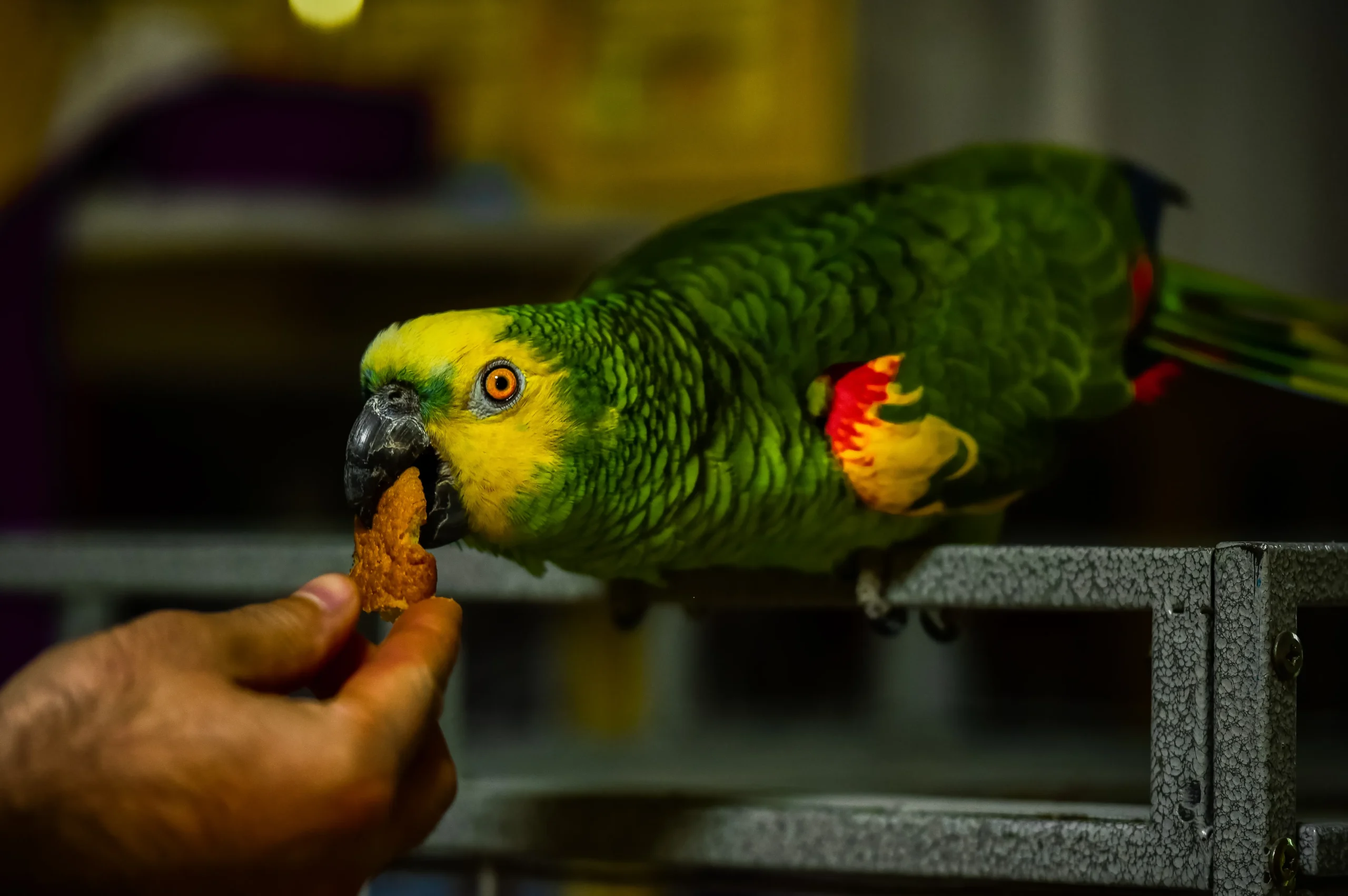


Leave a Comment